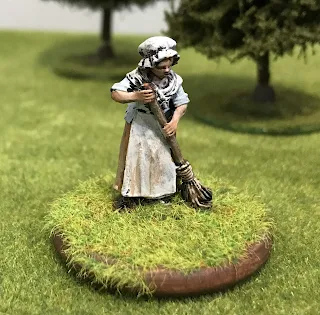Club game day and it is a big, American Civil War spectacular. Infantry, artillery, cavalry, a fleet of ships and a observation balloon. Here is the scenario for the game:
"McClellan has landed his army at Fort Monroe on the peninsula. He now must get his siege train in position to bombard Richmond and take the rebel capitol. With naval assets available, the Union players will need to fight their way up the peninsula to Richmond. the Confederates must stop the Federals and protect the capitol."
The table for this game was over 20 feet long. There were twists and turns and all sorts of interesting terrain. Off table was the James River. Both sides ships were extremely nice models mounted on moveable tables. A most amazingly clever idea!
 |
| Richmond. |
 |
| Unimpressed observers. |
Both sides set up on the far table with the majority of their troops. The Southerners had some river batteries to protect the water front. The Northerners had two transport ships which could hold a division each. These could land anywhere along the river. If they landed in the waterfront by the piers they could land the entire division plus guns. Otherwise only a brigade at a time and no artillery. The Federals had two transport ships and two casement iron clads while the Confederate head a single iron clad ship.
Both sides set up the majority of their forces on the far table. The Federals planned on using their artillery superiority to blast through the Confederate lines. This was a long process and sounded better then it worked. This front was a neat grinder and both sides were locked in a see saw action which saw heavy casualties but little movement.
 |
| Naval action. |
Shore batteries
 |
| Confederate division moves to stop the naval landing. |
This caused the action to move to my front with a battle between ironclad ships and shore batteries. The heavy guns of the shore batteries blasted the ships and kept them at a distance. But the two Federal ironclad hanged up on the line Confederate ship and eventually sank her. But not before a transport was sunk. This meant the Federals could only land a single division. Which they did behind enemy lines and within sight of the outskirts of Richmond. But the Southern commander had held a infantry and cavalry division in reserved for just this eventuality. So the landing party was stymied.
In all it was a very fun game and a visual spectacular. Thank you to Ralph. For all the hard work you put into this. The game saw 25 club members participate. The game lasted from 9:00 AM to 4:30 PM.














































